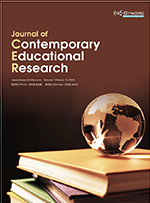Abstract
With the advancement of economic globalization, mobile networks and media technology are developing rapidly. Media information is manufactured and spread at any time, and people can better understand global information with the help of the media. In the Internet era, college students, overwhelmed by complex information and a lack of information discernment, are susceptible to indulging in the curated online world presented by others. At the same time, negative information such as false, violent, and pornographic also spread rapidly in various media. These phenomena impact students’ media literacy and affect their mental health, thereby leading to learning burnout. This study analyzes the current situation of learning burnout among university students, explores the effective path of improving online education of college students, and provides a theoretical basis for reducing the burnout of college students and assisting students in developing a positive mentality.
References
Kidd T, Robersonm L, 2009, Motivating Students in Online Courses: Exploring the Role of Choice in Creating a Positive Experience. International Journal on E-Learning, 9(3): 339–356.
Zhu J, 2006, Middle School Students’ Study Burnout and its Influencing Factors, thesis, East China Normal University, 12–78.
Wei Z, 2007, Study on Main Factors of Middle School Students’ Study Burnout and its Individual Differences, thesis, Nanjing Normal University, 89–124.
Maslach C, Jackson SE, Leiter MP, 1986, Maslach Burnout Inventory Manual, Consulting Psychologists Press, Palo Alto, CA.
Chen Y, 2007, Study on Learning Burnout and its Influencing Factors Among Current University Students, thesis, Shanghai Normal University, 12–78.
Ning W, 2022, Current Status and Promotion of Undergraduate Media Literacy in Ethnic Universities, dissertation, Minzu University of China.
